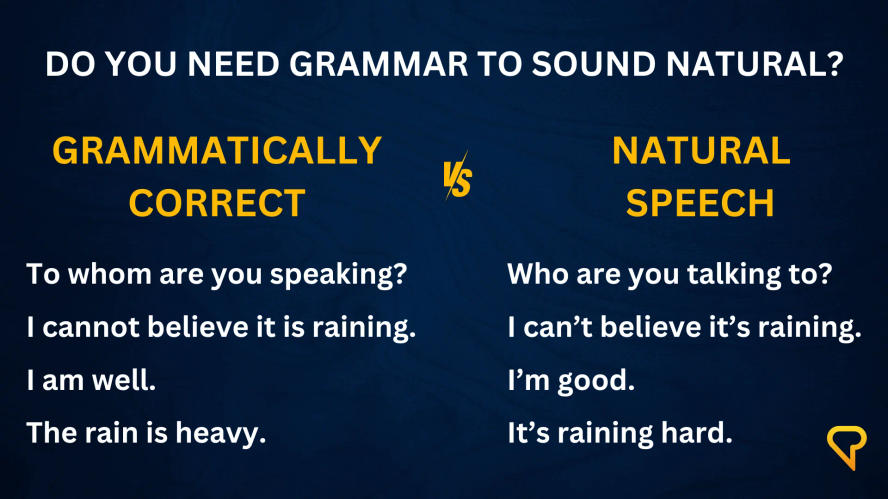When it comes to learning a new language, the debate around the role of grammar is as lively as ever. Do you need grammar to learn a language? The short answer: not really. In this post, we’ll dive deeper into the interplay between grammar, speaking, and language acquisition.
The Role of Grammar in Language Learning
A Help or a Hindrance?
Grammar has its place in language learning. However, its role is more nuanced than you might think. On the one hand, grammar can provide clarity, helping us more explicitly understand patterns and structures that we’ve already encountered. On the other hand, focusing too much on grammar can heighten what Stephen Krashen refers to as the “affective filter.“
If you constantly second-guess yourself while speaking or writing, you may be placing too much value on grammar. A language learner shouldn’t be more worried about correctness than communication. This inhibits natural fluency. Precision is important, but it should not block or disrupt your flow of communication.
Speaking Is More Than Following Rules
Speaking a language isn’t about perfectly following grammar rules; it’s about using patterns and structures that feel natural. Understanding what is grammatically correct and maintaining a natural sounding conversation are different skills.

When we speak a language our brain goes through three key steps:
- Retrieve easy-to-use words and phrases: We speak with patterns and language that we’re comfortable with. Much of spoken language consists of repetitive, automatic responses.
- Reuse familiar patterns: We rely on structures that have worked for us in the past. In other words, we don’t ponder grammar rules when speaking. We formulate sentences with go-to “templates” to get our message across.
- Suppress what doesn’t fit: We avoid words or structures that don’t align with the context.
Keeping this in mind, you don’t necessarily need grammar to learn a language and speak well, but rather a robust pool of vocabulary and patterns. Speaking well isn’t just about avoiding grammatical errors—it’s about using the right words in the right context. In my experience, the biggest challenge for learners is often incorrect word usage, not grammar.
The Connection Between Input and Output
Why Input Is Key
The best way to speak well is to spend time reading and listening. These input activities are intricately connected to speaking. When we listen or read, we internalize how to naturally use words and phrases to create meaning. This reinforces our ability to plan and produce language naturally.

Active Reading & Listening = Better Speaking & Writing
Reading widely in your target language builds your vocabulary and deepens your understanding of natural word usage. To come across more naturally as a speaker or writer, reading and listening are key. What are some strategies to improve in a language without overloading on grammar?
- Read and listen to content that interests you. You’re more likely to develop a consistent habit of reading and listening to the language if you enjoy the content.
- Build vocabulary through context. Gradually expand your vocabulary by reading and listening extensively. The more comprehensible language you engage with, the more examples you have to naturally speak on certain topics or handle certain social situations in the target language.
- Speak Often, Without Fear: Engage in conversations and don’t worry about perfection. Don’t let perfectionism prevent you from communicating. You’ll improve naturally over time.
- Learn Through Examples: If you do use grammar resources, choose ones with plenty of examples to help you internalize patterns. Develop intuition versus memorize rules.
Final Thoughts
Well, do you need grammar to learn a language? Success in language learning isn’t about memorizing grammar rules; it’s about building a vast repertoire of vocabulary and patterns through exposure. The more you read, listen, and speak, the more naturally you’ll develop the ability to use the language fluently and precisely.
In short, skip the grammar drills and pick up a book, listen to an audiobook, or dive into engaging content. Your ability to speak well will grow organically, and you won’t need to rely on grammar rules to get there.
You don’t need to banish grammar from your learning routine. However, fluency in a language is not based on how well you understand a language’s grammar. Knowing the rules and actually playing the game are two different skills.








comments on “Do You Need Grammar to Learn a Language?”